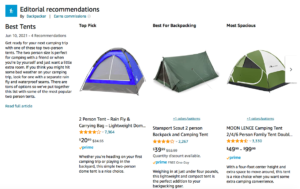At Seller Rocket, we provide access to product recommendations from reputable publishers on multiple platforms. One of our most requested services is access to Amazon Editorial Recommendations, editorial content that lives directly on Amazon search pages.

The Best Tents: An Editorial Recommendation Written by Backpacker
We can’t fully guarantee access to Amazon Editorial Recommendations because products have to meet a few requirements:
Of these, stocked inventory is likely the most pertinent to seasoned sellers, and is especially important because it shows both the publishers of the content and Amazon that you’re a reliable seller.
Patterns of low inventory cause Amazon to favor competitors over your products, dropping both your BSR and organic rank on desirable search terms. Though you can do some damage control when inventory is low, the best marketers handle a pattern of short inventory by better understanding the supply chain and adjusting requested inventory accordingly.
Many sellers hope for the best with supply chain issues and scramble to accommodate problems when they arise. But visibility is essential to long-term success. Much can be done to track shipping that can help sellers better gauge how much and how frequently inventory should be ordered.
The best factors to track in shipping are out-of-stock dates, delays – both in production and in shipping – and the average shipment arrival times.
Contents
There are studies like that of Sixleaf’s, that show that inventory has little to no effect on organic rank, however organic rank can drop as a result of many after-effects and decisions made by sellers in preparation for stock-out.
Many sellers respond to their diminishing inventory by raising their prices. Though this can improve profits on remaining inventory, doing so can decrease click-through and conversion rates, which harms organic rank. A study performed by Sellics found that keeping products at their original price will have a better lasting effect on organic rank than raising them.
Additionally, redirecting PPC is often the best course of action when a product goes out of stock – obviously, it doesn’t make sense to pay for clicks when there’s no chance for conversion. Losing PPC, though necessary, is going to reduce your organic rank even further.
Once inventory is back in stock, you’ll have to run aggressive PPC and other marketing efforts to boost your organic ranking again, so you should expect a high ad spend for a few weeks following a stock out.
To avoid the negative effects on sales and organic rank, the best thing you can do is to track efforts and alter those effects as you learn more about your shipping patterns.
Knowing in advance that you’ll be out of stock can help prepare for the negative effects and hopefully minimize the cost. For example, if you’re aware that a product is going to go out of stock, you’ll lose more money running PPC for that product. Though Amazon states that they’ll immediately halt your PPC campaigns, there have been instances, such as those at Bobsled Marketing, where this isn’t the case and you’ll continue to pay for clicks with no conversions.
The best thing to do in preparation for going out of stock is to reallocate your marketing budget to other SKUs.
Additionally, if you’re already utilizing Amazon Editorial Recommendations, you can have other SKUs prepared to swap into your editorials in advance so that money is not lost on advertising.
Once your product is back in stock, it’s important to shift your PPC efforts back to that product to start boosting your organic ranking.
It’s important to know immediately if there’s an order delay so that you can prepare by determining if a stockout will occur, reallocating PPC, implementing safety stock, and deciding the best course of action for product pricing.
Not only is it important to know if there is a delay, but to know what type. Production and shipping delays have different effects and require different responses from the seller.
Production delays mean that no inventory is prepped to ship, and may not ship at all. It’s important to have safety stock prepared to compensate for production delays, and it’s important to track delay times to see if you need to prepare for stock-outs.
Shipping delays mean that inventory will ship, however, if you have multiple shipments waiting, they may all ship at once, or arrive much closer together than you had planned. Amazon has had issues with warehouses being at capacity in the past, and once all of your product arrives, you may have to wait even longer for your inventory to be checked in. Alternatives for storing your excess inventory may have to be found.
To best prepare for these situations, it’s important to closely track delays and shipment arrival times.
To prepare for two shipments that are scheduled to arrive at the same time, it’s best to alter marketing efforts to compensate for the surplus in supply.
Though you may have a coupon schedule, a surplus in the supply of one product can take the warehouse space of another product or shipment. To reduce the quantity, it’s best to target the surplus product with coupons and reduce its volume within the warehouse.
The best way to track shipping times is to go through an external service like Anvyl. Anvyl is a service meant to bring sellers closer to their manufacturers by helping sellers stay on top of their supply chain.
Sellers can track shipping and production delays, arrival times, and inventory of their products, and contact their manufacturers to gain a better understanding of why delays occur.
Using a service like Anvyl’s is a great way to keep on top of shipping efforts and alter accordingly to reduce loss. Once you’ve used Anvyl for a while, you’ll better understand shipping times delay length and frequency, which will allow you to better predict how much and how frequently to order inventory.

Maya Harper is the Seller Rocket Marketing Lead. Her biggest focus is on developing meaningful partnerships and content for the eCommerce ecosystem. You can contact her by emailing her at maya@sellerrocket.io or reaching out to her via LinkedIn.
© 2025 SellerRocket TM . All Rights Reserved.
Get our latest updates directly to your inbox.
Only the best in eCommerce and affiliate news, tips and tricks.
